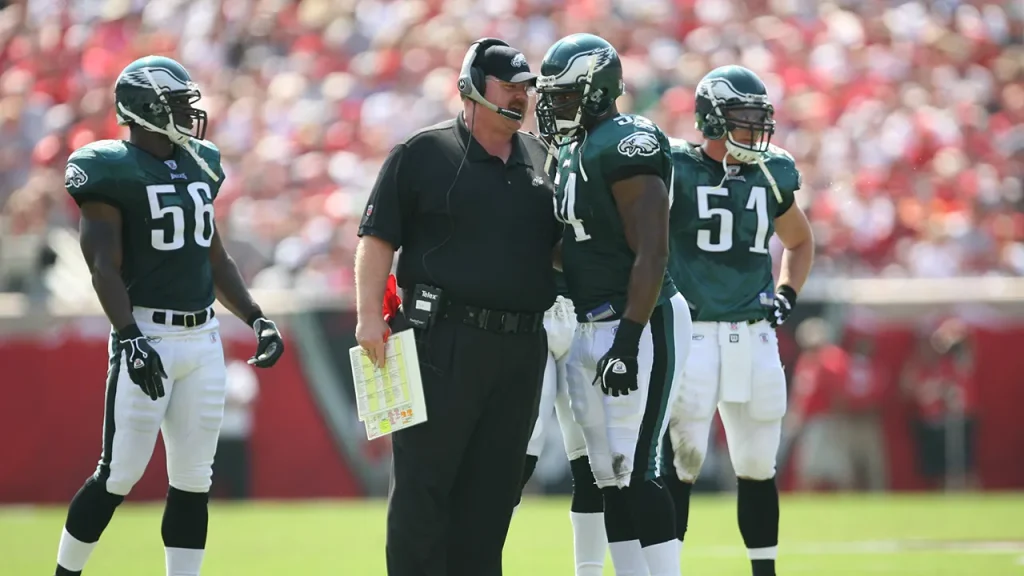Andy Reid’s journey to Super Bowl LVII presents a compelling narrative interwoven with threads of history, mentorship, and familial legacy. His nearly fifteen-year tenure with the Philadelphia Eagles, culminating in a Super Bowl appearance, laid the foundation for his later triumphs with the Kansas City Chiefs. Now, at the helm of the Chiefs, Reid finds himself facing his former team, a reunion tinged with both familiarity and the competitive fire of a championship game. This particular Super Bowl matchup is rendered even more intriguing by the presence of Jeremiah Trotter Jr., the son of a former Eagles linebacker whom Reid coached during his time in Philadelphia.
The younger Trotter, a fifth-round draft pick, follows in the footsteps of his father, Jeremiah Trotter Sr., an Eagles Hall of Famer. The elder Trotter played for eight seasons in Philadelphia during three separate stints with the team, seven of which coincided with Reid’s time as head coach. Reid has expressed admiration for both father and son, acknowledging the younger Trotter’s talent and dedication, honed at Clemson and now flourishing with the Eagles. The familial connection adds a layer of personal significance to the game, highlighting the enduring impact of Reid’s coaching legacy. The fact that Trotter Jr. wears the same jersey number as his father further amplifies this sense of lineage and continuity.
Beyond the personal connections, the Super Bowl LVII matchup features a captivating quarterback duel between Patrick Mahomes of the Chiefs and Jalen Hurts of the Eagles. Mahomes, already a two-time Super Bowl champion, embodies the dynamism and innovative play-calling that have become hallmarks of the Chiefs’ offense under Reid. Hurts, in his first Super Bowl appearance, leads a resurgent Eagles team, showcasing his dual-threat capabilities as both a passer and a runner. This quarterback clash represents a generational shift in the NFL, with Mahomes representing established dominance and Hurts symbolizing the league’s exciting future.
This particular Super Bowl holds historical significance for both teams. A victory for the Chiefs would secure their third Super Bowl title in franchise history and solidify their claim as a modern NFL dynasty. For the Eagles, a win would represent their second Super Bowl victory, cementing their place among the league’s elite. The game serves as a rematch of Super Bowl LII, where the Eagles triumphed over the Patriots in a thrilling upset. The rematch dynamic adds another layer of drama to the contest, as both teams aim to write a new chapter in their respective histories.
The narrative of Andy Reid’s career comes full circle in this Super Bowl confrontation. His past success with the Eagles, the mentorship he provided to players like Jeremiah Trotter Sr., and his recent achievements with the Chiefs all converge in this single game. The matchup embodies the cyclical nature of the NFL, where past relationships and experiences often intersect with present-day competition. Reid’s influence on both teams underscores the enduring impact of a successful coach, shaping not only individual careers but also the trajectory of entire franchises.
This Super Bowl provides a platform to showcase not just the athletic prowess of the players, but also the strategic brilliance of the coaches. Reid’s offensive ingenuity against the Eagles’ defensive resilience promises a fascinating tactical battle. The game transcends a simple contest for the Lombardi Trophy; it represents a culmination of individual stories, team aspirations, and the enduring legacy of one of the NFL’s most respected coaches. The stage is set for a memorable Super Bowl, rich with personal connections, historical significance, and the promise of a thrilling showdown between two of the league’s top teams.

